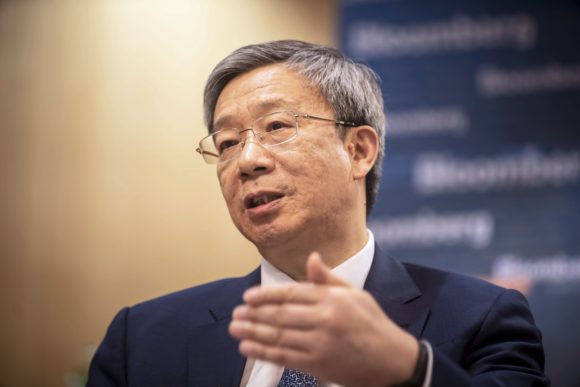Ant Group Co. could resume its plans for an initial public offering once problems are resolved, China’s central bank chief said, offering some relief to global investors seeking signs on what the future holds for the world’s largest fintech giant.
People’s Bank of China Governor Yi Gang said relevant agencies are still investigating issues related to monopolies at billionaire Jack Ma’s Ant Group, adding that the matters were “complicated” and some risks concerned consumer privacy. To resolve the problems, regulators need a clear legal framework, Yi said on a panel at the World Economic Forum on Tuesday.
“I would say that this is a process and also once the problem solved, it will go back to the track to continue consideration according to law,” Yi said in English. When asked whether that means an IPO, he added that if the company follows the legal structure, “you will have the result.”
Chinese regulators are asking Ant to work on a timetable to overhaul its business after abruptly halting its $35 billion IPO in November. The fate of Ma’s sprawling fintech empire remains uncertain after China issued a slew of draft rules that threatened to curb growth for some of Ant’s most lucrative businesses.

The message from Yi is the latest sign that Ant has avoided a worst-case scenario where it needs to shutter businesses completely. Ma resurfaced in January, ending a months-long period away from public view that fueled intense speculation about his plight.
Ma addressed teachers via a livestream during an annual event in January to commend rural educators, talking about how he’ll spend more time on philanthropy. The co-founder of Alibaba Group Holding Ltd. and Ant didn’t mention his recent run-ins with Beijing during his address.
Shares of Alibaba rose as much as 3.9% on Wednesday morning in Hong Kong.
Last Friday, China’s banking regulator said recent measures that have hit Ant hard weren’t aimed at any specific company.
While regulators stopped short of directly asking for a breakup of the company in December, the central bank stressed that Ant needs to “understand the necessity of overhauling” and come up with a timetable as soon as possible.
Monopoly Risks
PBOC Deputy Governor Pan Gongsheng said in an op-ed in the Financial Times on Wednesday that regulators are trying to strike a balance between encouraging fintech innovation and preventing financial risks.
“Network effects mean that fintech competition often leads to ‘winner-takes-all’ outcomes including market monopolies and unfair competition,” he wrote.
Uncertainty remains for several of Ant’s businesses, including consumer loans, crowdfunded health-care and payments. The central bank said last week that any non-bank payment company with half of the market in online transactions or two entities with a combined two-thirds share could be subject to antitrust probes, according to draft rules.
If a monopoly is confirmed, the central bank can suggest the cabinet impose restrictive measures including breaking up the entity by its business type. Firms already with payment licenses would have a one-year grace period to comply with the new rules.
China’s insurance and banking regulator said last week it would analyze the risks of internet companies’ crowdfunding health-care operations and take necessary measures. Ant said the same day that the chief architect of its health-care business, which is known as Xianghubao, resigned.
Meanwhile, Ant’s consumer loans business could need more capital to comply with draft rules that place more stringent requirements on its lending units.
Ant needs to inject at least 70 billion yuan ($11 billion) of new capital just for its credit-lending business, Bloomberg Intelligence analyst Francis Chan estimated in December. That calculation is based on draft rules that require Ant to co-fund 30% of loans, with a maximum asset leverage of five times.
Key Changes Under Draft Rules and Impact on Firms
Online lending companies like Ant would be required to provide 30% of funding for loans. Impact: More capital needed; Ant holds about 2% of loans on its books
Firms to be banned from operating outside provincial bases without special approval from the banking watchdog. Permission, if granted, to be renewed every three years. Impact: Require some firms to reapply for licenses; more frequent scrutiny
Those lending in multiple provinces to have a 5 billion yuan of minimum registered capital. Impact: More capital, greater scrutiny on operations
A shareholder cannot control more than one micro-lender operating nationally. Impact: Limits expansion vehicles
Top Photo: Employees walk through the campus of the Ant Group Co. headquarters in Hangzhou, China. Photographer: Qilai Shen/Bloomberg
Topics China
Was this article valuable?
Here are more articles you may enjoy.



 ‘Structural Shift’ Occurring in California Surplus Lines
‘Structural Shift’ Occurring in California Surplus Lines  Insurify Starts App With ChatGPT to Allow Consumers to Shop for Insurance
Insurify Starts App With ChatGPT to Allow Consumers to Shop for Insurance  Florida’s Commercial Clearinghouse Bill Stirring Up Concerns for Brokers, Regulators
Florida’s Commercial Clearinghouse Bill Stirring Up Concerns for Brokers, Regulators  A 10-Year Wait for Autonomous Vehicles to Impact Insurers, Says Fitch
A 10-Year Wait for Autonomous Vehicles to Impact Insurers, Says Fitch 

